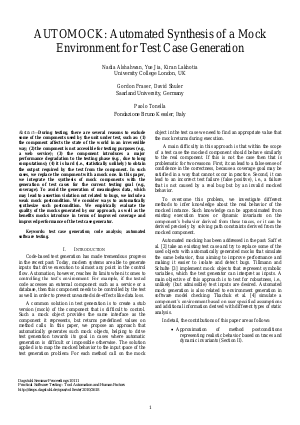AUTOMOCK: Automated Synthesis of a Mock Environment for Test Case Generation
Authors Nadia Alshahwan, Yue Jia, Kiran Lakhotia, Gordon Fraser, David Shuler, Paolo Tonella
-
Part of:
Volume:
Dagstuhl Seminar Proceedings, Volume 10111
Part of: Series: Dagstuhl Seminar Proceedings (DagSemProc) - License:
 Creative Commons Attribution 4.0 International license
Creative Commons Attribution 4.0 International license
- Publication Date: 2010-06-28
File

PDF
DagSemProc.10111.3.pdf
- Filesize: 232 kB
- 4 pages
Document Identifiers
Subject Classification
Keywords
- Test case generation
- code analysis
- automated software testing
Metrics
- Access Statistics
-
Total Accesses (updated on a weekly basis)
0Document
0Metadata
Abstract
During testing, there are several reasons to exclude some of the components used by the unit under test, such as: (1) the component affects the state of the world in an irreversible way; (2) the component is not accessible for testing purposes (e.g., a web service); (3) the component introduces a major performance degradation to the testing phase (e.g., due to long computations); (4) it is hard (i.e., statistically unlikely) to obtain the output required by the test from the component. In such cases, we replace the component with a mock one. In this paper, we integrate the synthesis of mock components with the generation of test cases for the current testing goal (e.g., coverage). To avoid the generation of meaningless data, which may lead to assertion violation not related to bugs, we include a weak mock postcondition. We consider ways to automatically synthesize such postcondition. We empirically evaluate the quality of the mocks generated by our approach, as well as the benefits mocks introduce in terms of improved coverage and improved performance of the test case generator.
Cite As Get BibTex
Nadia Alshahwan, Yue Jia, Kiran Lakhotia, Gordon Fraser, David Shuler, and Paolo Tonella. AUTOMOCK: Automated Synthesis of a Mock Environment for Test Case Generation. In Practical Software Testing : Tool Automation and Human Factors. Dagstuhl Seminar Proceedings, Volume 10111, pp. 1-4, Schloss Dagstuhl – Leibniz-Zentrum für Informatik (2010)
https://doi.org/10.4230/DagSemProc.10111.3
BibTex
@InProceedings{alshahwan_et_al:DagSemProc.10111.3,
author = {Alshahwan, Nadia and Jia, Yue and Lakhotia, Kiran and Fraser, Gordon and Shuler, David and Tonella, Paolo},
title = {{AUTOMOCK: Automated Synthesis of a Mock Environment for Test Case Generation}},
booktitle = {Practical Software Testing : Tool Automation and Human Factors},
pages = {1--4},
series = {Dagstuhl Seminar Proceedings (DagSemProc)},
ISSN = {1862-4405},
year = {2010},
volume = {10111},
editor = {Mark Harman and Henry Muccini and Wolfram Schulte and Tao Xie},
publisher = {Schloss Dagstuhl -- Leibniz-Zentrum f{\"u}r Informatik},
address = {Dagstuhl, Germany},
URL = {https://drops.dagstuhl.de/entities/document/10.4230/DagSemProc.10111.3},
URN = {urn:nbn:de:0030-drops-26180},
doi = {10.4230/DagSemProc.10111.3},
annote = {Keywords: Test case generation, code analysis, automated software testing}
}
